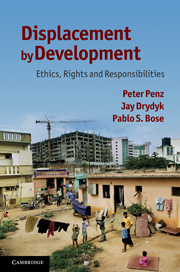PART II - FROM COST–BENEFIT ANALYSIS TO ETHICS
Published online by Cambridge University Press: 05 June 2012
Summary
In the chapters of Part II, we attempt to identify ethical requirements that responsible development must meet, in relation to displacement and resettlement. For two reasons, we begin with cost–benefit analysis: as the most commonly used tool for evaluating development projects, it has an unavoidable ethical component; and its consequentialist approach to human welfare identifies an issue of distributive justice that is central to displacement – namely, compensation.
Our leading question is whether cost–benefit analysis is adequate in taking account of the ethical issues in displacement by development. The answer turns out to be no, essentially because cost–benefit has been developed as an aggregative public-interest test (based on a conception of ‘social efficiency’) generally banning distributive justice (‘equity’) from cost–benefit analysis to the realm of political concerns. Efforts to incorporate the latter will be shown to have failed. And yet cost–benefit analysis turns out to be illuminating even with respect to distributive justice, because of its focus on compensation. It measures social costs in terms of the compensation that would be required to offset them. This means that cost–benefit analysis recognizes displacement as a social cost to be minimized, but compensation is applied only hypothetically, as an accounting method in the aggregation of costs and benefits. Still, it readily provides a signpost to a distributive-justice argument for actual compensation.
Information
- Type
- Chapter
- Information
- Displacement by DevelopmentEthics, Rights and Responsibilities, pp. 59 - 62Publisher: Cambridge University PressPrint publication year: 2011
